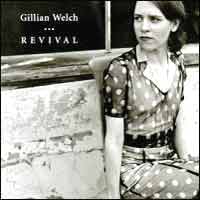| Died Pretty: "Free Dirt" (Citadel, Jan. 1996) |
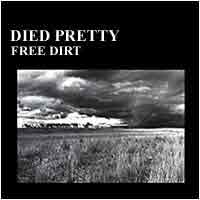 Died Pretty sind Australier und spielen unspektakulären, aber wunderschönen
und kraftvollen Rock. Keinen Punk. Keinen Metall. Keinen Grunge. Einfach
Rock. Mit einem guten Sänger (Ronald S. Peno), einem Klassegitarristen
(Brett Myers) und solider Rhythmusgruppe. Am besten kommt aber
die fette Hammond B3 von Frank Brunetti. Produziert hat das Ganze
Rob Younger, der Ex-Sänger der kultigen Radio Birdmen,
Australiens Antwort auf MC5 und die Stooges.
Died Pretty sind Australier und spielen unspektakulären, aber wunderschönen
und kraftvollen Rock. Keinen Punk. Keinen Metall. Keinen Grunge. Einfach
Rock. Mit einem guten Sänger (Ronald S. Peno), einem Klassegitarristen
(Brett Myers) und solider Rhythmusgruppe. Am besten kommt aber
die fette Hammond B3 von Frank Brunetti. Produziert hat das Ganze
Rob Younger, der Ex-Sänger der kultigen Radio Birdmen,
Australiens Antwort auf MC5 und die Stooges. |
| Motorpsycho: "Blissard" (Stickman, Feb. 1996) |
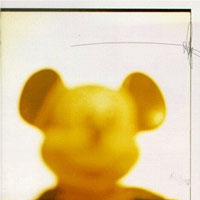 Norwegens bestes Trio, aufgestockt sogar zum Quintett durch einen Keyboarder und
Produzent Helge Sten alias Deathprod, der Theremin, Sampler
und Oszillatoren bedient, mit einem ihrer besten Alben: nicht mehr ganz
so hart, mehr Pop, viel psychodelisches Gefrickel. Enthält mit
"S.T.G." einen meiner Lieblingsongs der Band, der in der aktuellen
DVD-Dokumentation auch gleich zweimal
toll gespielt wird.
Norwegens bestes Trio, aufgestockt sogar zum Quintett durch einen Keyboarder und
Produzent Helge Sten alias Deathprod, der Theremin, Sampler
und Oszillatoren bedient, mit einem ihrer besten Alben: nicht mehr ganz
so hart, mehr Pop, viel psychodelisches Gefrickel. Enthält mit
"S.T.G." einen meiner Lieblingsongs der Band, der in der aktuellen
DVD-Dokumentation auch gleich zweimal
toll gespielt wird.
(04.07.2008) |
| Tortoise: "Millions Now Living Will Never Die" (Thrill Jockey", Feb. 1996) |
 Spannender Instrumental-Rock(?) aus Chicago und in Indie-Kreisen ein
überraschungserfolg von den Multiinstrumentalisten John McEntire
(hyperaktiver Tonmischer, Produzent und Schlagzeuger in diversen Bands,
u.a. "The Sea And Cake"),
Douglas McComb (Bassist bei den wunderbaren
Eleventh Dream Day), David Pajo (Will Oldham; aktuell in
der neuen Band von Ex-Smashing Pumkin Billy Corgan, deren Namen
mir gerade nicht einfallen will, irgendwas mit "Z" oder so)
und anderen mir unbekannten Mitstreitern. Klingt alles immer ein bisschen
nach deutschen Bands wie Can und Kraftwerk. Ungewöhnlich
auch, dass die Gitarre meist nur eine untergeordnete Rolle spielt, dafür
aber oft zwei Bässe und zwei Schlagzeuge gleichzeitig eingesetzt
werden.
Spannender Instrumental-Rock(?) aus Chicago und in Indie-Kreisen ein
überraschungserfolg von den Multiinstrumentalisten John McEntire
(hyperaktiver Tonmischer, Produzent und Schlagzeuger in diversen Bands,
u.a. "The Sea And Cake"),
Douglas McComb (Bassist bei den wunderbaren
Eleventh Dream Day), David Pajo (Will Oldham; aktuell in
der neuen Band von Ex-Smashing Pumkin Billy Corgan, deren Namen
mir gerade nicht einfallen will, irgendwas mit "Z" oder so)
und anderen mir unbekannten Mitstreitern. Klingt alles immer ein bisschen
nach deutschen Bands wie Can und Kraftwerk. Ungewöhnlich
auch, dass die Gitarre meist nur eine untergeordnete Rolle spielt, dafür
aber oft zwei Bässe und zwei Schlagzeuge gleichzeitig eingesetzt
werden.

 Mehr ...
Mehr ...
"To some, the emergence of Tortoise was a worrying
sign. When their debut album was released in 1994 complete with long instrumental
workouts, many critics cried that prog-rock had returned and we would all
be cast back into the bad days of the mid-Seventies and its dinosaur rock.
Although at times their debut did lapse into fits of navel-gazing, it showed
plenty of promise for greater things. Sure enough on their second LP, "Millions
Now Living Will Never Die", all expectations were both met and exceeded.
Previous noodlings were replaced with perfect craftmanship and a beautifully
constructed sound was created.
The album was propelled by the odd combination of two basses, two percussionists,
keyboards, guitars, vibraphone, melodica and a host of other under-used
instruments. With all wrapped up together, things certainly gelled. Starting
with the twenty minute sprawl of "Djed", the track's texture is
constantly changing, from lo-fi to high-tech to heavy orchestration and
onto fields of static. "Glass Museum" follows it with softly played
guitar occasionally rising in a quasi-classical arrangement to be married
with glowing cymbals. The tiny "A Survey" ticks by like a precision
watch with the sounds of a contry field at night-time in the foreground
and massaged bass. "Dear Grandma And Grandpa" is like nothing
else you have heard before, with dubby bass filters and a warm techno hum
drenching its every move. Matters come to a close with the cinematic "Along
The Banks Of Rivers", which could double as fitting closing music to
a bloody western. With it's net of influences cast far and wide - from rock,
dub and classical, from both east and west - "Millions Now Living..."
is a record that neither Tortoise nor anyone else in their field is likely
to surpass." (John Dee) |
|
| The Walkabouts "Devil's Road" (Virgin, Feb. 1996) |
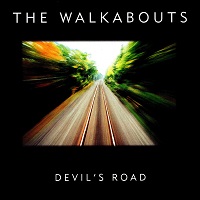 Willkommen zurück ...
Willkommen zurück ...
(18.09.2016)

 Mehr ...
Mehr ...
Ein Himmel voller Geigen: Reissue des 1996er-Albums der Amerikana-Band.
1996 standen die Walkabouts an einem Scheidepunkt. Die Band aus Seattle brauchte ein neues Label, die Major-Firma Virgin ein bisschen Glaubw�rdigkeit. Das erste Resultat der Zusammenarbeit war das Album �Devil�s Road�. Ein h�heres Budget erm�glichte den Walkabouts die Umsetzung einer Idee, die Songwriter Chris Eckman schon lange im Kopf herumspukte: Die Songs der Band - zartbittere Balladen und Midtempo-Nummern zwischen Folk, Country und Klagelied - sollten mit Streicherarrangements versehen werden.
Zusammen mit dem Arrangeur Mark Nichols arbeitete Eckman an den Arrangements, die in einem Rundfunkstudio in Warschau mit Streichern des Warschauer Philharmonieorchesters aufgenommen wurden. Es war ein weiterer Meilenstein auf dem Weg der Band zur ewigen Suche nach dem perfekten Song. Eckman: �Auf jeden Fall haben die Songs die Zeit �berdauert. Wir haben sie noch sehr lange live gespielt, in sehr unterschiedlichen Versionen.� Und: �The Light Will Stay On� wurde ein kleiner Hit.
Beide kennzeichnet die abwechslungsreiche Mischung aus Balladen und Rocknummern, der Wechsel von laut und leise � alles auf hohem Niveau.
(Good Times, August / September 2014)
|
| "The Coctails" (Carrot Top, März 1996) |
 "Zweitband"
des Sea And Cake-Gitarristen
Archer Prewitt, der hier auch singt. Blöder Bandname, gute
Musik. "Zweitband"
des Sea And Cake-Gitarristen
Archer Prewitt, der hier auch singt. Blöder Bandname, gute
Musik. |
| Mark Eitzel: "60 Watt Silver Lining" (Virgin, März 1996) |
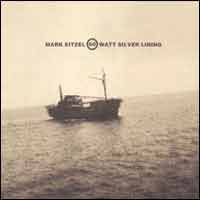 Nach einem Solo/Livealbum von 1991, noch zu Lebzeiten des American
Music Clubs, hier das eigentliche Solodebüt seines Vorsitzenden
nach der Clubschliessung 1994. Zwar war schon das Spätwerk des
Clubs bei Virgin ein kommerzieller Flop, aber man versuchte es nochmal
zusammen. Genauso gelungen. Genauso erfolglos. Wunderbare Platte. Obwohl
Eitzel ein begnadeter Songschreiber ist gefällt mir hier am besten
die Coverversion des Carole King-Klassikers "No Easy Way Down".
Nach einem Solo/Livealbum von 1991, noch zu Lebzeiten des American
Music Clubs, hier das eigentliche Solodebüt seines Vorsitzenden
nach der Clubschliessung 1994. Zwar war schon das Spätwerk des
Clubs bei Virgin ein kommerzieller Flop, aber man versuchte es nochmal
zusammen. Genauso gelungen. Genauso erfolglos. Wunderbare Platte. Obwohl
Eitzel ein begnadeter Songschreiber ist gefällt mir hier am besten
die Coverversion des Carole King-Klassikers "No Easy Way Down". |
| Flowerpornoes: "Ich & Ich" (Moll, März 1996) |
 Der Schwanengesang von Duisburgs bester Band (wer lästert da was von
Peter Bursch und seiner "Bröselmaschine"?). Mit den "Gaststars"
Chris Cacavas an der Orgel und
Regisseur Leander Hausmann an der Mundharmonika. Tom Liwa
bringt uns dann noch eine wunderbare Version von "Sweet Thing"
von Van The Man!
Der Schwanengesang von Duisburgs bester Band (wer lästert da was von
Peter Bursch und seiner "Bröselmaschine"?). Mit den "Gaststars"
Chris Cacavas an der Orgel und
Regisseur Leander Hausmann an der Mundharmonika. Tom Liwa
bringt uns dann noch eine wunderbare Version von "Sweet Thing"
von Van The Man! |
| Stereolab: "Emperor Tomato Ketchup" (Elektra, März 1996) |
 Die Band um die charmante französiche Sängerin Laetitia Sadier und den englischen Gitarristen Time Gane legt hier
ihr zweites Majoralbum vor. Für viele Leute ihr bestes Album. Kann
sein. Aber eigentlich kann ich mich da nicht wirklich entscheiden.
Die Band um die charmante französiche Sängerin Laetitia Sadier und den englischen Gitarristen Time Gane legt hier
ihr zweites Majoralbum vor. Für viele Leute ihr bestes Album. Kann
sein. Aber eigentlich kann ich mich da nicht wirklich entscheiden.

 Mehr ...
Mehr ...
Stereolab was poised for a breakthrough release with Emperor Tomato Ketchup, their fourth full-length album. Not only was their influence becoming apparent throughout alternative rock, but Mars Audiac Quintet and Music for the Amorphous Body Center indicated they were moving closer to distinct pop melodies. The group certainly hasn't backed away from pop melodies on Emperor Tomato Ketchup, but just as their hooks are becoming catchier, they bring in more avant-garde and experimental influences, as well. Consequently, the album is Stereolab's most complex, multi-layered record. It lacks the raw, amateurish textures of their early singles, but the music is far more ambitious, melding electronic drones and singsong melodies with string sections, slight hip-hop and dub influences, and scores of interweaving counter melodies. Even when Stereolab appears to be creating a one-chord trance, there is a lot going on beneath the surface. Furthermore, the group's love for easy listening and pop melodies means that the music never feels cold or inaccessible. In fact, pop singles like "Cybele's Reverie" and "The Noise of Carpet" help ease listeners into the group's more experimental tendencies. Because of all its textures, Emperor Tomato Ketchup isn't as immediately accessible as Mars Audiac Quintet, but it is a rich, rewarding listen.
(by Stephen Thomas Erlewine, All Music Guide)
Avantgardistischer Spirit mit loungigem Charme versetzt – zeitlos wunderbar.
(Stereoplay, Oktober 2019)
|
| Rosanne Cash: "10 Song Demo" (Capitol, April 1996) |
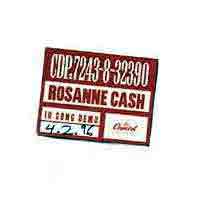 Ein klasse Album von Johnnys Tochter! Und keine Sorge: das Ganze ist
keine unfertige Skizzensammlung, sondern richtig gut gelungen, wenn
auch auf fette Arrangements verzichtet wurde.
Ein klasse Album von Johnnys Tochter! Und keine Sorge: das Ganze ist
keine unfertige Skizzensammlung, sondern richtig gut gelungen, wenn
auch auf fette Arrangements verzichtet wurde.

 Mehr ...
Mehr ...
|
"Rosanne Cash has more family ties to the country
world than anyone, but she has turned her back on Nashville for a new
career as a New York pop singer. Or so she thinks. Her first non-Nashville
album, 10 Song Demo, may have a low twang quotient, but it pursues the
main concerns of traditional country music: troubled marriages and midlife
crises.
The title, 10 Song Demo, is misleading on two counts: It actually contains
11 songs, and it's not really a demo. Although almost every track begins
solely with Cash's voice and acoustic guitar, and is only gradually filled
in with tasteful coloring by electric guitar, bass and keyboards, the
arrangements don't sound unfinished as much as they sound stripped to
their essence. And because these songs are about getting past distractions
to confront the bedrock issues in ending one marriage, starting another
and turning 40, the arrangements are just right. Cash is an inspired vocal
interpreter, and her husky alto doesn't need much instrumental support
to get every mixed emotion out of a line like "I'll kiss you till
we turn to stone/I'll fight you till we're blind," from "Bells
and Roses."
The singer's verbal meditations are boiled down to shorter lines and plainer
language on 10 Song Demo. Instead of sounding like sprawling, graduate-school
poetry, Cash's new lyrics have the tight meter and homespun wisdom of
old Appalachian ballads. When she wants to complain about a man who is
scared of making a commitment on "If I Were a Man," she sings,
"If I were a man, I'd be so sweet/I'd give me everything I need."
Maybe Loretta Lynn wouldn't feel comfortable with the hushed, meditative
arrangements on 10 Song Demo, but she would certainly recognize the subject
matter. And she would no doubt admire the skill with which Rosanne Cash
gets every last emotion onto tape." (Rolling Stone)
|
|
| "Cash knows that bare-bones doesn't mean tuneless.
Demo's spare arrangements reinforce the sturdiness of her melodies."
(Entertainment Weekly) |
|
| "Eloquent tributes to various moments in her life,
like a trip to Paris ('The Summer I Read Colette') and the aging process
('Take My Body') fill the record...Because 10 Song was actually recorded
as a demo, using only acoustic guitar on most tracks, there's little in
the way of production to distract from Cash's expressive voice—a heart-wrench
alto that can stand alone any day." (US) |
|
| Steve Earle: "I Feel Alright" (E-Squared, Mai 1996) |
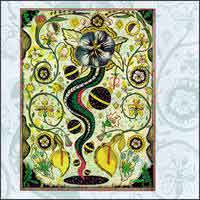 Gut wie alles aus dem Hause Earle. Den Titel "More
Than I Can Do" haben wir uns mit Waiting For Louise ganz hurtig
geschnappt und zu einem festen Bestandteil unseres Repertoires gemacht.
Der obere Link bringt Euch zu einer Liveaufnahme als MP3 vom Januar 2003
Gut wie alles aus dem Hause Earle. Den Titel "More
Than I Can Do" haben wir uns mit Waiting For Louise ganz hurtig
geschnappt und zu einem festen Bestandteil unseres Repertoires gemacht.
Der obere Link bringt Euch zu einer Liveaufnahme als MP3 vom Januar 2003 |
| The High Llamas: "Hawaii" (Sony/Alpaca Park, Juni 1996) |
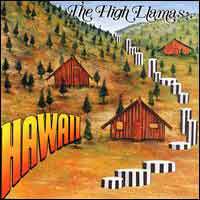

 Mehr ...
Mehr ...
Dann kam der dritte Streich: Hawaii (******), das bislang reifste Werk der Herren O´Hagan, Holdaway, Bennett, Fell und Allum. Eine Hommage an Brian Wilsons (unver�ffentlichtes) Smile-Album, f�r die der Begriff „eing�ngig“ neu definiert werden mu�: Elektronische Klanglandschaften, kombiniert mit Banjos, Bl�sern und Streichern, �berzogen von einem Hauch Easy Listening a la Mancini oder Bacharach.
(ME/Sounds))
|
| Lyle Lovett: "The Road To Ensenada" (Curb, Juni 1996) |
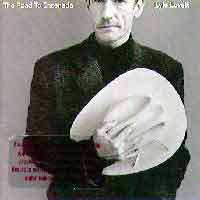

 Mehr ...
Mehr ...
|
I think it's safe to say that there are not too many people
out there quite like Lyle Lovett. One of the most creative singer-songwriters
on the scene, he's a Texan through and through, embracing country music,
but is about as musically eclectic an artist as you will find. He's an
engaging singer with a distinctive voice and a gifted lyricist, but he
nevertheless writes some songs that can only be described as having downright
weird words. After being a confirmed bachelor well into his 30s, Lovett
suddenly married movie star Julia Roberts. After being pretty much the
domain of Public Radio, he found himself plastered on the front pages
of the supermarket tabloids and trash TV shows. Lovett also acted in a
few films himself.
After creating a series of outstanding albums with an often
jazzy group he called his Large Band, in October 1994, Lovett released
I Love Everybody, a collection of older songs he had lying around since
as long ago as the 1970s, performed with scaled back arrangements. They
included a few pieces with some of the most eccentric lyrics of his career.
That album was released during his happy marriage to Ms. Roberts, and
many of Lovett's fans were wondering if there was anything autobiographical
to be heard the record. But Lovett stressed that all the songs pre-dated
his engagement and marriage.
Well, Lovett and Roberts have separated, and thus the tabloids
have lost interested in the songwriter. Now he is out a collection of
new songs called The Road to Ensenada, which shows him up to his old tricks
again -- creating songs that make you wonder what goes through his mind,
-- if you take the time to listen carefully to the lyrics. Also as usual,
musically, the album is very tastefully done, running from twangy country
to jazzy, with some introspective folkie-type songs in there as well.
Texas has a rich tradition of singer-songwriters, going
back to people like Jerry Jeff Walker, Townes Van Zandt, Guy Clarke and
scores of fine current-day artists. Lovett grew up on their music listening
them in folk clubs in college as he studied journalism. He made an interesting
admission in an interview a couple of years ago -- that while he was familiar
with many of Bob Dylan's songs, he had never actually listened to an entire
Dylan album straight through. I think that serves to illuminate Lovett's
penchant for creating his own world, paying little attention to styles
and trends around him.
His record-company described The Road to Ensenada, Lovett's
sixth album, as being the his most "radio-friendly to date."
Radio-friendly, of course, is a euphemism for lowering standards enough
to be played on commercial radio. Lovett has had a couple of songs that
found their way onto commercial country radio, but for the most part Public
Radio has been the territory of Lovett's music. The new album does have
perhaps two tracks that one could imagine being played on the commercial
airwaves -- one more or less straight country tune, such as he has done
in the past, and a song likely to find a place on the contemporary country
stations. Both have lyrics that are mostly harmless, and tunes you can
go around humming. But those concessions having been made, Lovett is up
to his usual tricks, with odd characters, unsuccessful attempts at starting
love affairs, some odes to things Texan, and one song that could be interpreted
as being about his relationship to Roberts. The arrangements range from
Nashville-style with a weeping steel guitar, to bossa nova, to rollicking
Western Swing, to introspective folkie-style. But except for horns on
the Western Swing song, I miss the presence of Lovett's Large Band. This
time, he enlists some well-known musical figures to join him in background
vocals, including Jackson Browne, Shawn Colvin, and another eccentric
in his own right Randy Newman.
The Road to Ensenada has a lot in common with I Love Everybody,
with the same co-producer with Lovett, Billy Williams, recorded in the
same Los Angeles studio with the same drummer, Russ Kunkel, and pianist,
Matt Rollings, who has been on most of Lovett's albums. Rollings, unfortunately,
is not featured quite as often this time. The bassist is Leland Sklar,
who together with Kunkel were a staple of Jackson Browne, Linda Ronstadt
and James Taylor albums during the 1970s. The backing musician who really
distinguishes himself this time around is violinist Stuart Duncan, a figure
from the bluegrass and New Acoustic scene.
Lyle Lovett has come up with another mostly brilliant album
in The Road to Ensenada. The lyrics may not be quite as weird as on his
last album I Love Everybody, or the arrangements as eclectic or jazzy
as on Joshua Judges Ruth, which I still consider the high point of his
career. But Lyle Lovett is one of a kind, and the combination of his highly
original songwriting style, his appealing vocals, with his easy-going
and engaging musical personality makes him one of the most significant
creative figures on the singer-songwriter and country music scenes. There
are few people who can slip between upbeat Western Swing and moody songs
of regret, between twangy cry-in-your-beer country and bossa nova, between
elaborate story-songs like the title track, and novelty lyrics like Don't
Touch My Hat with Lovett's unpretentious ease.
From a sonic standpoint, Lovett again keeps his standards
very high. Engineer Nathaniel Kunkel, who also mixed I Love Everybody,
actually adds a little subtle reverb to Lovett's vocal, after several
albums with Lovett's voice almost completely without any electronic effects.
That seems another element in this album's attempt to reach wider audiences.
But the sound is still first-rate, with great clarity and decent dynamic
range.
Many may have gotten to know Lyle Lovett as Julia Roberts'
funny-looking ex-husband, but for over a decade his records have been
winning fans among a rather diverse audience from country music aficionados
to connoisseurs of literate singer-songwriters. This new album is likely
increase his audience. While some of his long-time fans might consider
parts of The Road to Ensenada a bit of a commercial compromise, I think
very few will be disappointed in the overall result.
(George Graham, broadcast on WVIA-FM 7/3/96)
|
|
| Del McCoury Band: "The Cold Hard Facts" (Rounder, Juni 1996) |
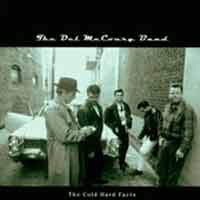 Eine der weltbesten Bluegrassbands. Und (zumindest auf dem Cover) ganz ohne Cowboyhüte.
Eine der weltbesten Bluegrassbands. Und (zumindest auf dem Cover) ganz ohne Cowboyhüte.
|
| Norma Waterson (Hannibal, Juni 1996) |
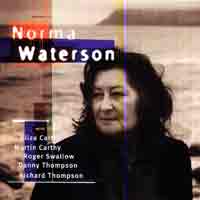 Norma Waterson ist vielen von Euch sicherlich unbekannt, obwohl sie eine der
allerwichtigsten Sängerinnen aus der britischen Folk-Szene ist.
Sicherlich vom Kaliber der leider viel zu früh verstorbenen Sandy
Denny. Nach meinem (in diesem Bereich etwas dürftigen) Wissensstand
hat sie mit diesem titellosen Album erstmals eine Kollektion von zeitgenössischem
Liedmaterial statt traditioneller Lieder vorgelegt: u.a. "Black
Muddy River" von Garcia/Hunter (wodurch wir bei Waiting
For Louise letztendlich erst zu unserer Version inspiriert worden sind),
"St. Swithin's Day" von Billy Bragg, "God Loves
A Drunk" von Richard Thompson, "The Birds Will Still
Be Singing" von Elvis Costello und "Pleasure And Pain"
von Ben Harper.
Norma Waterson ist vielen von Euch sicherlich unbekannt, obwohl sie eine der
allerwichtigsten Sängerinnen aus der britischen Folk-Szene ist.
Sicherlich vom Kaliber der leider viel zu früh verstorbenen Sandy
Denny. Nach meinem (in diesem Bereich etwas dürftigen) Wissensstand
hat sie mit diesem titellosen Album erstmals eine Kollektion von zeitgenössischem
Liedmaterial statt traditioneller Lieder vorgelegt: u.a. "Black
Muddy River" von Garcia/Hunter (wodurch wir bei Waiting
For Louise letztendlich erst zu unserer Version inspiriert worden sind),
"St. Swithin's Day" von Billy Bragg, "God Loves
A Drunk" von Richard Thompson, "The Birds Will Still
Be Singing" von Elvis Costello und "Pleasure And Pain"
von Ben Harper.
Vorzüglich besetzt ist die Begleitband, sozusagen die Creme de
la Creme der britischen Folkrockszene: Richard Thompson (Ex-Fairport
Convention) an der E-Gitarre, Ehemann Martin Carthy (britische
Folklegende und Ex-Steeleye Span) an der Akustikgitarre, Danny Thompson
(Ex-Pentangle, wichtigster Begleiter von John Martyn und auch Nick Drake)
am Kontrabass, Roger Swallow (Ex-Matthews Southern Comfort und
Ex-Albion Band - lange nichts mehr von ihm gehört!) und Tochter
Eliza Carthy als Geigerin und mit zweiter Gesangsstimme. Die
Platte klingt sehr warm und transparent, was sicherlich auch an Produzent
John Chelew liegt, dem wir schon das wunderbare Album "Bring
The Family" von John Hiatt zu verdanken haben. |
| Cache Valley Drifters: "Echoes And Reflections" (Taxim, Juli 1996) |
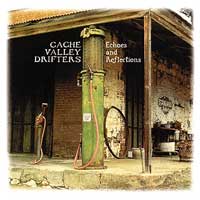 Eine reaktivierte Bluegrassband aus Kalifornien, die in den 70ern schon mal
in eigener Sache und als Begleitband von Kate
Wolf aktiv war. Zu den alten Mitgliedern David West (Multisaitenvirtuose
und Verantwortlicher der CD-Reihe "Picking On...", hier hauptsächlich
am Banjo zu hören), Bill Griffin (Mandoline) und Wally
Barnick (Bass) kommt als Neuzugang der Gitarrist Mike Mullins.
Das virtuose Spiel stellt sie durchaus in eine Liga mit der Del
McCoury Band, allerdings werden Unterschiede bei der Songauswahl
deutlich, wo die Cache Valley Drifters (als Ex-Hippies?) sich auch bei
Vorlagen aus dem Rock&Pop-Bereich bedienen (hier z.B. "White
Room" von Cream). Wie gesagt, die Burschen sind aus Kalifornien
und nicht aus Nashville!
Eine reaktivierte Bluegrassband aus Kalifornien, die in den 70ern schon mal
in eigener Sache und als Begleitband von Kate
Wolf aktiv war. Zu den alten Mitgliedern David West (Multisaitenvirtuose
und Verantwortlicher der CD-Reihe "Picking On...", hier hauptsächlich
am Banjo zu hören), Bill Griffin (Mandoline) und Wally
Barnick (Bass) kommt als Neuzugang der Gitarrist Mike Mullins.
Das virtuose Spiel stellt sie durchaus in eine Liga mit der Del
McCoury Band, allerdings werden Unterschiede bei der Songauswahl
deutlich, wo die Cache Valley Drifters (als Ex-Hippies?) sich auch bei
Vorlagen aus dem Rock&Pop-Bereich bedienen (hier z.B. "White
Room" von Cream). Wie gesagt, die Burschen sind aus Kalifornien
und nicht aus Nashville! |
| Robert Forster: "Warm Nights" (Beggars Banquet, Juli 1996) |
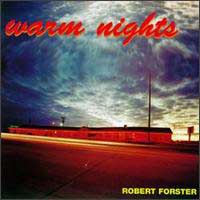

 Mehr ...
Mehr ...
Das 1996 erschienene Album Warm Nights festigte Roberts Status als einer der großen Songwriter der Post-Punk-Ära. Robert erinnert sich, dass der Produzent Edwyn Collins "den [beabsichtigten] Sound des Albums genau getroffen hat: ein trockener, tiefer Groove, der irgendwo zwischen Creedence Clearwater Revival und Willie Mitchells Hi-Records-Arbeiten aus den frühen 70ern liegt".
Die Wiederveröffentlichung von 2024 ist so etwas wie ein 'Director's Cut' mit einer bisher unveröffentlichten 'Brass'-Version von 'Fortress' (die ursprüngliche Albumversion ist auf der Bonus-7" des Vinylpakets enthalten), 'Half The Way Home' ersetzt 'Rock 'n' Roll Friend' (ebenfalls auf der Bonus-7").
Das Artwork von "Warm Nights" wurde von der ursprünglichen Designerin Leni Hoffman liebevoll überarbeitet und enthält neue Linernotes von Robert Forster.
Neu gemastert in den Abbey Road Studios.
Produced by Edwyn Collins, a longtime acquaintance of Forster from their Orange Juice/Go-Betweens days on the Postcard label, Warm Nights continues the string of wry, sharp romance from Forster's other solo releases. The flavor of Warm Nights is a touch less obviously country-pitched in comparison -- more of the deft, understated rock/pop that the Go-Betweens were known for more returns, though occasional acoustic steel guitar breaks and the like show that Forster hasn't turned away from that approach entirely. If anything, though, the most notable guest musical work comes from a different angle, with five separate folks credited for a variety of brass instruments (tuba, trombone, and the like), plus another guest on cello. Collins himself helps lead the core band backing Forster, and both his performance and production emphasize a calm, wiry approach that's very direct, going so far as to leave in the occasional glitch or audible tape edit. Forster's singing is extremely clear and straightforward, sounding like he's singing right in a listener's ear, without being overbearing (though there's a hint of over-modulation on the recording once or twice). Musically, touches like rough guitar solos buried under echo and the New Orleans jazz horns on "Fortress" give Warm Nights a comparative depth, balancing the immediacy of the music with greater detail. One song worthy of attention is "Rock 'n' Roll Friend," a Go-Betweens rarity turned into a low-key anthem (though admittedly the organ soloing could easily have been lost without hurting the performance). Other notable tracks include the title cut, a quick, nervous kick, and the light R&B/funk groove of "Jug of Wine." Warm Nights itself turned out to be the last album Forster released before the Go-Betweens' reunion, but as the end, for now, of his solo career, it's a worthy effort.
(by Ned Raggett, All Music Guide)
|
| David Munyon: "Acrylic Teepees" (Glitterhouse, Juli 1996) |
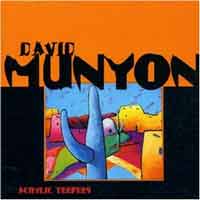 Das Album entstand im legendären Jack Clement Recording Spa
in Nashville, unter Mithilfe von den Sessionspezis Craig Krampf
(drums) und Dave Pomeroy (Bass) und Al Perkins (u.a. bei
Stephen Stills Manassas
und Emmylou Harris' Nash Ramblers
dabei gewesen) an Gitarre, Lap-Steel und Dobro.
Das Album entstand im legendären Jack Clement Recording Spa
in Nashville, unter Mithilfe von den Sessionspezis Craig Krampf
(drums) und Dave Pomeroy (Bass) und Al Perkins (u.a. bei
Stephen Stills Manassas
und Emmylou Harris' Nash Ramblers
dabei gewesen) an Gitarre, Lap-Steel und Dobro.
David Munyon hat eine Art Songs zu schreiben und sie vorzutragen, die
den Hörer sofort in der skurillen Welt dieses Außenseiters
gefangen nehmen.

 Mehr ...
Mehr ...
|
"Mit nur wenigen prägnanten Gitarrenakkorden
schafft dieser Barde der Landstraße eine vollendete, zeitlose Song
Poesie." (Stereoplay)
<
|
|
| "Auf `Acrylic Teepees´ spielt der Mann die Akkorde
mit einer derartigen Intensität, als könne jeder sein letzter
sein." (Kölner Stadtanzeiger) |
|
| "...Kräftig ist seine südstaatliche und country-rockige
Handschrift auf der Gitarre, wenn er in seinen Songs über Junkies,
Obdachlose und Träumer erzählt ... und mit Hobo-Feeling nicht
geizt." (Frankfurter Rundschau) |
|
| " Die schläfrig-melancholischen Songs, die David
Munyon nur so aus dem Ärmel zu schütteln scheint, ... sind bestens
geeignet für lauschige Abende auf der Veranda....`Ain't No Love In
This Rock'n'Roll World´ singt Munyon und sein gelassener Sprechgesang
wird durch die wunderbaren Klänge von Al Perkins ergänzt, die
dieser seiner Steelgitarre entlockt, die er schon für die Country-Legende
Gram Parsons zum Klingen brachte." (Wiener Zeitung) |
|
| Ween: "12 Golden Country Greats" (Flying Nun, Juli 1996) |
 Da ich eigentlich kein Ween-Fan bin, komme ich besser damit klar, dass
hier nicht der übliche Ween-Stilgemisch geboten wird, sondern Countrymusik
mit viel Humor und einer gewissen Intelligenz, Lässigkeit und Verschrobenheit,
die normalen Nashville-Produktionen völlig abgeht. Dies ist auch
meine erste (somit unvorbelastete) Begegnung mit dem Kosmos von Dean
und Gene Ween und ich kann mit diesem wesentlich mehr mit anfangen als
mit dem, was ich seitdem von den Jungs noch gehört habe ("The
Mollusk" von 1997 und "The Pod" von 1991). Aber mit dieser
Einstellung stehe ich wohl ziemlich alleine da. Ob die Platte mit Songs
wie "Piss Up The Rope" auf der anderen Seite aber echten Countryfreunden
gefällt ist zu bezweifeln. Ob die Jungs aus Bob's Bunker (denkt
an die "Good Old Boys"/" Blues Brothers"!) wohl
lebendig wieder herausgekommen wären?
Da ich eigentlich kein Ween-Fan bin, komme ich besser damit klar, dass
hier nicht der übliche Ween-Stilgemisch geboten wird, sondern Countrymusik
mit viel Humor und einer gewissen Intelligenz, Lässigkeit und Verschrobenheit,
die normalen Nashville-Produktionen völlig abgeht. Dies ist auch
meine erste (somit unvorbelastete) Begegnung mit dem Kosmos von Dean
und Gene Ween und ich kann mit diesem wesentlich mehr mit anfangen als
mit dem, was ich seitdem von den Jungs noch gehört habe ("The
Mollusk" von 1997 und "The Pod" von 1991). Aber mit dieser
Einstellung stehe ich wohl ziemlich alleine da. Ob die Platte mit Songs
wie "Piss Up The Rope" auf der anderen Seite aber echten Countryfreunden
gefällt ist zu bezweifeln. Ob die Jungs aus Bob's Bunker (denkt
an die "Good Old Boys"/" Blues Brothers"!) wohl
lebendig wieder herausgekommen wären?

 Mehr ...
Mehr ...
| The main problem with 12 Golden Country Greats (which only
contains ten songs, by the way) is that it's Ween's first album to concentrate
on a single music genre and such concentration lends the impression that
they consider themselves above the genre. But that isn't entirely the case.
Ween recorded 12 Golden Country Greats in Nashville with numerous legendary
musicians, including the Jordanaires, Buddy Spicher, Charlie McCoy, Hargus
"Pig" Robbins, and Russ Hicks. The presence of these musicians
gives the music a very authentic feeling, even though the songs stick to
'60s trends like country-pop, country-folk, and polished honky tonk. Some
of Ween's songs fit this style perfectly, such as the rolling "You
Were the Fool," "I'm Holding You," "Japanese Cowboy,"
"Fluffy," "Help Me Scrape the Mucus off My Brain," and
"Pretty Girl." Even the vulgar honky tonk of "Piss up a Rope"
works, turning into a truly delightful gem. The duo runs into trouble on
the homophobic "Mister Richard Smoker," as well as with some of
the vaguely elitist views that underpin the songs, such as on "I Don't
Wanna Leave You on the Farm." Still, Ween's gift for songcraft and
the talents of the Nashville musicians prevent the album from being just
a joke. In fact, it's as satisfying as any of their records, and gutsier,
too. After all, no country fan will want to hear this record and most of
their fans are afraid of country music, and that's sort of an admirable
move. (Stephen Thomas Erlewine, All Music Guide) |
|
| Jerry Douglas & Peter Rowan: "Yonder" (Sugar Hill, Aug. 1996) |
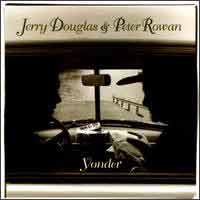 Eine gelungene Duo-Aufnahme des weltbesten Dobrospielers Douglas mit einem
der bekanntesten Sänger/Gitarristen aus dem Bluegrass-Bereich.
Rowan spielte schon als Jungspund in der Bands von Bill Monroe,
später mit David Grisman (bei Earth
Opera und Old And In The Way)
und Jerry Garcia (Old And In
The Way).
Eine gelungene Duo-Aufnahme des weltbesten Dobrospielers Douglas mit einem
der bekanntesten Sänger/Gitarristen aus dem Bluegrass-Bereich.
Rowan spielte schon als Jungspund in der Bands von Bill Monroe,
später mit David Grisman (bei Earth
Opera und Old And In The Way)
und Jerry Garcia (Old And In
The Way). |
| Valerie Carter: "The Way It Is" (Countdown, Okt. 1996) |
 Valerie
verdient ihr Geld als Chorsängerin bei James Taylor und
hat es in fast 20 Jahre auf gerade mal 2 Soloalben gebracht. Auf diesem
Album gibt es eine schöne Version von Van Morrisons "Into
The Mystic" mit Lyle Lovett als Duettpartner, die uns
zu unserer W4L-Version inspiriert hat. Valerie
verdient ihr Geld als Chorsängerin bei James Taylor und
hat es in fast 20 Jahre auf gerade mal 2 Soloalben gebracht. Auf diesem
Album gibt es eine schöne Version von Van Morrisons "Into
The Mystic" mit Lyle Lovett als Duettpartner, die uns
zu unserer W4L-Version inspiriert hat. |
| Low: "The Curtain Hits The Cast" (Virgin/Caroline/Vernon Yard, Okt. 1996) |
 70 Minuten lang schafft es dieses amerikanische Trio mit einer Gitarre,
einem Bass, wenigen Trommeln (von einem "Schlagzeug" kann
man eigentlich nicht sprechen!) und zwei Stimmen (vom Ehepaar Trommlerin
Mimi Parker und Gitarrist Alan Sparhawk), spärlichen
Keyboardhintergrundklängen (von Bassist Zak Sally und Produzent
Steve Fisk) eine unvergleichliche Stimmung zu erzeugen!
70 Minuten lang schafft es dieses amerikanische Trio mit einer Gitarre,
einem Bass, wenigen Trommeln (von einem "Schlagzeug" kann
man eigentlich nicht sprechen!) und zwei Stimmen (vom Ehepaar Trommlerin
Mimi Parker und Gitarrist Alan Sparhawk), spärlichen
Keyboardhintergrundklängen (von Bassist Zak Sally und Produzent
Steve Fisk) eine unvergleichliche Stimmung zu erzeugen!

 Mehr ...
Mehr ...
|
Für eine Band, die CODEINE seit nunmehr drei Alben den Rang in Sachen
tongewordener Langsamkeit und Tristesse abzulaufen scheint, beweist das
Trio aus Duluth/Minnesota eine merkwürdige, ja fast skurrile Art
von Humor, welcher man in dieser Kombination doch eher selten begegnet.
Zeilen wie "Lent you my favourite dictionary/ came back with ripped
out pages - you can't stop violence" sind da keine Seltenheit, und
man fragt sich, ob die drei derart gepflegten Sarkasmus immer auf Valium
zelebrieren, wo sie zur Feier des Tages doch bereits JOY DIVISIONs "Transmission"
tempomäßig völlig zum Erliegen brachten und dem Ganzen
einen beinahe surrealen Anstrich verpaßten. Überhaupt scheint
es LOWs erklärtes Ziel zu sein, die Grenzen des Machbaren in diesem
Bereich auf jeder Veröffentlichung neu ausloten zu wollen, und so
verwundert es kaum, daß "The Curtain Hits ..." klingt
wie die Zeitlupen-Version der bereits äußerst schwermütigen,
aber nicht minder beeindruckenden Vorgänger-Alben "I Could Live
In Hope" und "Long Division" und daß mit "The
Plan" ein Stück enthalten ist, welches Eure Tränensäcke
unweigerlich auf Horst Tappert-Format anschwillen lassen dürfte und
selbst mit "schrecklich schön" nur höchst unzureichend
beschrieben werden kann ... Für all die Gelegenheits-Depressiven
unter Euch und diejenigen, die einem verregneten Sonntag-Nachmittag durchaus
etwas Positives abgewinnen können, führt absolut kein Weg an
dieser Platte vorbei ...!
Ralf Wetzel (www.intro.de)
|
|
|
The Curtain Hits the Cast was Low's first "major" album, taking
the indie buzz over their early work to a much larger audience. The band
didn't lose anything in the process -- the album shows them still firmly
entrenched in the epically slow, lazy dirges that got them started. The
only noticeable changes come in the form of more elaborate production,
and a shift in the ratio of dark, creepy dirges to pretty, comforting
ones (the latter winning out, as evidenced by the album's single, the
beautiful "Over the Ocean"). Low is one of those rare bands
who have created such a distinct musical world for themselves that even
major changes can't distract them from it -- just like every Cocteau Twins
album is unmistakably theirs, and always good, listening to any Low recording
involves revisiting a wonderful sound that can't be found anywhere else.
The Curtain Hits the Cast is more accessible than much of the band's earlier
work, but, since it's a Low album, it isn't really that much different
-- the album is probably the best introduction to Low's work.
(by Nitsuh Abebe, All
Music Guide)
|
|
| Belle & Sebastian: "If You're Feeling Sinister" (Jeepster, Okt. 1996) |
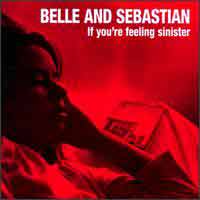 "In
some ways Belle and Sebastian were almost a recurrence of a Glaswegian
archetype. Hip, smart kids obsessed with utopian 1960s pop and boasting
a healthy lack of interest in kissing corporate butt have always been
an illuminating presence on the Glasgow underground, with a lineage
that runs back through the likes of The Pastels and Orange Juice. At
their best - and 1996's If You're Feeling Sinister is still their strongest
set of songs - they perfectly capture that delirious anything-could-happen
feeling that hits you as you start to leave your teens behind and discover
girls, books, boys, Glasgow late at night, music and venereal disease.
Songwriter and vocalist Stuart Murdoch has a fantastic eye for the surrealism
of everyday life and a deep compassionate joy in the world that is unrivalled
outside Bill Forsyth's Gregory's Girl - that other classic piece of
west-coast urban mythology. The Fox In The Snow is a beautifully lisped
paean to directionless outsiders, waiting just for life to happen to
them, while Like Dylan In The Movies, with its hallucinogenic brass
fantasias and lonely late-night atmospherics, works like dream logic
as Dylan´s benign presence hovers over a long walk home. But it´s
The Stars Of Track And Field that really caps the set, a fantastically
funny and poignant rumination on the loneliness of the small-town sports
star. It´s a record that constantly reminds you of just how magical
Glasgow can be, if only you know where to look. So start right here." "In
some ways Belle and Sebastian were almost a recurrence of a Glaswegian
archetype. Hip, smart kids obsessed with utopian 1960s pop and boasting
a healthy lack of interest in kissing corporate butt have always been
an illuminating presence on the Glasgow underground, with a lineage
that runs back through the likes of The Pastels and Orange Juice. At
their best - and 1996's If You're Feeling Sinister is still their strongest
set of songs - they perfectly capture that delirious anything-could-happen
feeling that hits you as you start to leave your teens behind and discover
girls, books, boys, Glasgow late at night, music and venereal disease.
Songwriter and vocalist Stuart Murdoch has a fantastic eye for the surrealism
of everyday life and a deep compassionate joy in the world that is unrivalled
outside Bill Forsyth's Gregory's Girl - that other classic piece of
west-coast urban mythology. The Fox In The Snow is a beautifully lisped
paean to directionless outsiders, waiting just for life to happen to
them, while Like Dylan In The Movies, with its hallucinogenic brass
fantasias and lonely late-night atmospherics, works like dream logic
as Dylan´s benign presence hovers over a long walk home. But it´s
The Stars Of Track And Field that really caps the set, a fantastically
funny and poignant rumination on the loneliness of the small-town sports
star. It´s a record that constantly reminds you of just how magical
Glasgow can be, if only you know where to look. So start right here."
|
| David Murray Octet: "Dark Star [The Songs Of The Grateful Dead]" (Astor Palace, Okt. 1996) |
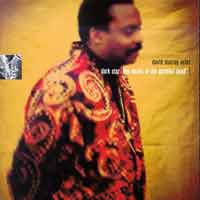 Einer der weltbesten Jazzsaxofonisten spielt "Dark Star" und
andere Grateful Dead-Klassiker! Das ist natürlich was für
mich.
Einer der weltbesten Jazzsaxofonisten spielt "Dark Star" und
andere Grateful Dead-Klassiker! Das ist natürlich was für
mich.

 Mehr ...
Mehr ...
The avant-garde tenor and bass clarinetist David Murray had an opportunity to sit in with the Grateful Dead in 1993 and was quite impressed. With Jerry Garcia's death, Murray was inspired to put together this tribute album but often it sounds as if two bands were playing at once without closely listening to each other. Murray and the horns (which include veteran altoist James Spaulding, the very impressive high-note acrobatics of trumpeter Hugh Ragin, either James Zoller or Omar Kabir on second trumpet and the adventurous trombonist Craig Harris) romp through some rowdy and very emotional ensembles while organist Robert Irving III. (a Miles Davis alumnus) leads the rhythm section through groovin' R&B riffs that seem to ignore the lead voices. The results are often quite silly as the horns screech and squawk while the rhythm churns on. There are two exceptions. The 16-minute "Dark Star" builds slowly to a ferocious level and finds the group acting as one while the closing "Shoulda Had Been Me" is a tenor-guitar duet between Murray and Bob Weir that works quite well. So overall this is a mixed bag, most highly recommended to listeners who have a high tolerance level and a strong sense of humor.
(by Scott Yanow, All Music Guide)
|
| Johnny Cash: "Unchained" (American, Nov. 1996) |
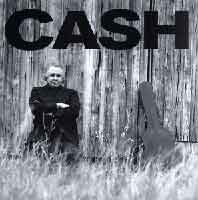
Das zweite von Rick Rubin produzierte Cash-Album. Im Gegensatz
zum völlig solo eingespielten Debüt American
Recordings halfen hier Tom Petty und seine Heartbreakers,
das Album in rockigere Gefilde zu entführen. Neben neuen Originalen,
alten Traditionals (Louvin Brothers, Jimmy Rodgers etc.), versucht
er sich erfolgreich an Beck´s „Rowboat“ und „Rusty
Cage“ von Soundgarden.
„Unchained ... ist ein tieftrauriges Meisterwerk.
Das liegt in erster Linie am beeindruckenden Spielwitz des Meisters
und der erstklassigen Songauswahl, die viel wagt und alles gewinnt...
Spektakulär unspektakulär und von ergreifender Schlichtheit
– die vielleicht wichtigste, auf ihre Weise originellste Platte
dieses Jahres.“ (ME/Sounds)
|
| Fuck: "Baby Loves A Funny Bunny" (Normal, Nov. 1996) |
 Gefunden in der digitalen Grabbelkiste!
Gefunden in der digitalen Grabbelkiste!
(20.02.2015)

 Mehr ...
Mehr ...
Nicht vom Namen abschrecken lassen, denn das ist eine der aufregendsten Gruppen im Spannungsfeld zwischen Swell, Yo La Tengo, Pavement und den Palace Brothers. Auf dem hier vorliegenden Zweitling bewegt sich das Quartett aus San Francisco um Gitarrist/Geiger und S�nger Kyle Stathan wieder in der angestammten, poetischen Klangwelt, in der langsam-bed�chtige Songskizzen a la Red House Painters mit engmaschigen Gitarrenlinien und br�chig-traurigem Gesang den Ton und die Stimmung vorgeben.
(Glitterhouse)
...eine Sammlung kaputter SloMo/Neo-Folk-Perlen in bester American Music Club/Palace Brothers-Tradition. Keine Frage, diese Platte w�chst und gedeiht, selbst im m�chtigen Schatten der wieder erstarkten SF-Institution Swell ...
(Intro)
Fuck ist die Band, die die wohl bezauberndsten Zeitlupen-Melodien zu schreiben im Stande ist.
(ME/Sounds)
|
| Wilco: "Being There" (Reprise, Nov. 1996) |
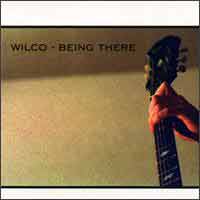 Jeff Tweedy, ehemals Bassist bei Uncle
Tupelo, ist auf diesem Doppelalbum mit seiner Band in Höchstform.
Gegen das Etikett "Alternative-Country" wehrt er sich mit
heftigstem Rock im Stil der Kinks und der Rolling Stones.
Jeff Tweedy, ehemals Bassist bei Uncle
Tupelo, ist auf diesem Doppelalbum mit seiner Band in Höchstform.
Gegen das Etikett "Alternative-Country" wehrt er sich mit
heftigstem Rock im Stil der Kinks und der Rolling Stones.

 Mehr ...
Mehr ...
"Und wieder war es Tweedy, der seinem alten Kumpel
Farrar hinsichtlich der Veröffentlichung einen kleinen Ende Schritt
voraus war. Im November `96 erschienen diese 19 Songs mit knapp 80 Minuten
Spielzeit, bei denen Tweedy das Wagnis einging, sich stilistisch freier
zu bewegen. Ein Schritt, der belohnt wurde, denn das Werk wurde überschwenglich
aufgenommen und riss den ME/Sounds zu folgender Lobeshymne hin: „...Die
19 Songs des Doppelalbums bleiben immer aufregend und geben die monochromen
Mühen anderer Gitarrenbands, die sich zwar alternativ nennen, in Wirklichkeit
aber austauschbar sind, der Lächerlichkeit preis... Jeff Tweedy und
seinen vier Musikerkollegen ist mit `Being There´ ein kleines Meisterwerk
gelungen, das für die zeitgenössische Country Musik soviel bedeutet,
wie das White Album der Beatles für die Rockmusik bedeutet hat: die
definitive Bestandsaufnahme dessen, was zum Zeitpunkt der Veröffentlichung
überhaupt möglich ist.“
Das musikalische Kontrastprogramm reicht von sentimentalen Pianosongs bis
zu ultra-traditionalistischen Country-Songs, von Folk-A-Billy bis Beach
Boys-ähnlichen Powerpoppern, von Honky Tonkern bis zu mit Streichern
garnierten Gänsehautballaden, dem mit atonalen Passagen versetzten
„Misunderstood“, klassischem Countrysound, Boogierock und einigem
mehr." (Glitterhouse) |
|
| „...a sprawling mix of moody late-night ballads, and
infectuous pop-rock tunes – confront adult insecurities forthrightly
and tunefully and document the maturation of a good band into a potentially
great one.“ (Option) |
|
| Mazzy Star: "Among My Swan" (Capitol, Dez. 1996) |
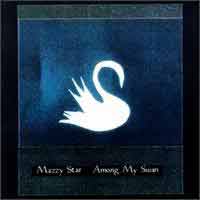 |
| Brute: "Nine High A Pallet" (Capricorn, 1996) |
 Europäische Veröffentlichung auf dem kleinen, aber feinen
Label Trocadero von Januar 2000 der bereits Ende 1993 aufgenommenen
und 1996 auf dem wiederbelebten Südstaatenrocklabel Capricorn
(Allman Brothers, Marshall
Tucker Band, etc.) erschienenen Zusammenarbeit diverser Legenden
aus Athens/Georgia: da wäre zuerst einmal Vic
Chesnutt (Songwriter extraordinaire, u.a. Autor von "Gravity
Of The Situation" aus dem W4L-Repertoire), dann die Southern-Rock/Jam
Band Widespread Panic, sowie Produzent John Keane (u.a.
R.E.M.), der auch noch ausgezeichnet Steelgitarre spielt.
Europäische Veröffentlichung auf dem kleinen, aber feinen
Label Trocadero von Januar 2000 der bereits Ende 1993 aufgenommenen
und 1996 auf dem wiederbelebten Südstaatenrocklabel Capricorn
(Allman Brothers, Marshall
Tucker Band, etc.) erschienenen Zusammenarbeit diverser Legenden
aus Athens/Georgia: da wäre zuerst einmal Vic
Chesnutt (Songwriter extraordinaire, u.a. Autor von "Gravity
Of The Situation" aus dem W4L-Repertoire), dann die Southern-Rock/Jam
Band Widespread Panic, sowie Produzent John Keane (u.a.
R.E.M.), der auch noch ausgezeichnet Steelgitarre spielt.
Neben „Snowblind“ von Hoyt Axton handelt es sich fast
durchweg um neue Chesnutt-Songs, wobei die vorwiegend zupackende Art
der Panic-Jungs einerseits exzellent zu den auf seinen Soloalben eher
brüchig vorgetragenen Kompositionen passt - und die Jungs andererseits
von den eher schlichteren Liedern von ihren sonst üblichen Ausschweifungen
etwas abgehalten werden. Man lerne: auch scheinbar unpassende Zutaten
können ein leckeres Gericht ergeben! |
| Gallon Drunk: "In The Long Still Night" (City Slang, 1996) |
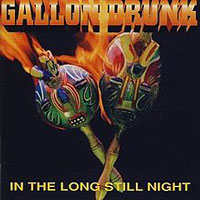 |
| Ida: "I Know About You" (Secret Machines, 1996) |
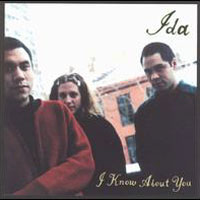 Das zweite Ida-Album entstand Januar 1996 im Trio: dazugekommen
war Daniels Bruder Michael Littleton am Schlagzeug. Was nicht
heißen soll, dass hier gerockt wird. Rick Lassiter ist ebenfalls
wieder mit seinem Kontrabass dabei, zusammen mit Daniels und Michaels
Schwester Cecilia Littleton (Geige und Bratsche) sorgt er für
schöne Streicherhintergründe.
Das zweite Ida-Album entstand Januar 1996 im Trio: dazugekommen
war Daniels Bruder Michael Littleton am Schlagzeug. Was nicht
heißen soll, dass hier gerockt wird. Rick Lassiter ist ebenfalls
wieder mit seinem Kontrabass dabei, zusammen mit Daniels und Michaels
Schwester Cecilia Littleton (Geige und Bratsche) sorgt er für
schöne Streicherhintergründe.
(11.01.2009)

 Mehr ...
Mehr ...
The remarkable I Know About You benefits greatly from the addition of drummer Michael Littleton, whose spartan, pensive rhythms add a powerful new dynamic to Ida's quietly intense sound; at the same time, the harmonies and songs of Dan Littleton and Elizabeth Mitchell resonate with greater intellectual clarity and emotional depth than on Tales of Brave Ida � tracks like "Back Burner" and the centerpiece "Treasure Chest" are simply stunning.
(by Jason Ankeny, All Music Guide)
|
| The Mutton Birds: "Envy Of Angels" (Virgin, 1996) |
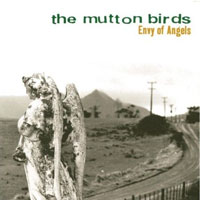 Ob man "Mutton Birds" wirklich mit "Hammel Vögeln"
übersetzen kann - das kann ich mit meinen Kenntnissen der Englischen
Sprache nicht sicher sagen. Auf jeden Fall handelt es sich bei "Neider
von Engeln" um eine ganz wunderbare Gitarrenpop-Platte, die mir
da bislang entgangen ist. Das hat sicherlich damit zu tun, dass die
Band von Sänger, Gitarrist und Hauptsongschreiber Don McGlashan
nur in ihrer Heimat Neuseeland - und vielleicht noch Australien - ein
wenig erfolgreich waren. Immerhin wurde dieses dritte Album vom bekannten
britischen Produzenten Hugh Jones (Echo
& The Bunnyman, del Amitri,
Dumptruck, etc.) in den legendären
Rockfield Studios in Wales aufgenommen.
Ob man "Mutton Birds" wirklich mit "Hammel Vögeln"
übersetzen kann - das kann ich mit meinen Kenntnissen der Englischen
Sprache nicht sicher sagen. Auf jeden Fall handelt es sich bei "Neider
von Engeln" um eine ganz wunderbare Gitarrenpop-Platte, die mir
da bislang entgangen ist. Das hat sicherlich damit zu tun, dass die
Band von Sänger, Gitarrist und Hauptsongschreiber Don McGlashan
nur in ihrer Heimat Neuseeland - und vielleicht noch Australien - ein
wenig erfolgreich waren. Immerhin wurde dieses dritte Album vom bekannten
britischen Produzenten Hugh Jones (Echo
& The Bunnyman, del Amitri,
Dumptruck, etc.) in den legendären
Rockfield Studios in Wales aufgenommen.
Aufgefallen war mir McGlashan auf der Doppel-CD "The
Sun Come Out" von Neil Finns der Allstarband 7 Worlds
Collide, wo er hauptsächlich an Blasinstrumenten wie dem Euphonium
(wohl so was wie 'ne Tuba?) und dem Flügelhorn zu hören ist,
aber auch für zwei Lieder, die zu den Highlights der Platten gehören,
als Sänger, Gitarrist und Songschreiber verantwortlich. Neugierig
geworden habe ich versucht, mehr über ihn im Internet herausbekommen:
klassisch ausgebildeter Orchestermusiker (Schlagwerk und Blechblasinstrumente),
in den 80ern dann Schlagzeuger in einer Punk- bzw. Hardcoreband namens
Blam Blam Blam (oder so ähnlich), in den 90ern Sänger
und Gitarrist bei den Mutton Birds, deren Alben hochgelobt werden,
immer wieder verglichen mit Landsleuten wie Crowded House oder
Nachbarn wie den Go-Betweens. Zur Zeit ist er mit einer CD unter
eigenem Namen unterwegs, die ich aber (noch) nicht kenne.
Aber warum empfehle ich jetzt "Envy Of Angels"? Tolle Stimme,
schöne Songs mit eleganten und gelegentlich ziemlich trickreichen
Akkordfolgen, die manchmal an der Kippe zum Stadionrock á la
U2 oder Coldplay stehen, aber NIE über diese Klippe
springen. Und ab und zu taucht dann im Klangspektrum noch das eine oder
andere Blechblasinstrument auf. Stadionrock aus einer besseren Welt.
(01.01.2010)

 Mehr ...
Mehr ...
Envy of Angels could have been recorded ten years earlier considering its invocation of the new south � in particular the moodiness of Dumptruck � not to mention similarities to more commercial guitar rock of the same period, such as that of 54-40. Perhaps it isn't a coincidence that Hugh Jones, who also worked with Dumptruck, produced Envy of Angels. He renders the Mutton Birds' guitar strum and jangle in more solemn than bright tones, which suits the sometimes poetic lyrics and unusual chord progressions. There are plenty of hooks in these songs, with "April" and "While You Sleep" being only two standouts. Despite the album's strengths, there is an obscure quality about Envy of Angels that will preserve the Mutton Birds' cult status while rewarding those listeners who find them.
(by Greg Adams, All Music Guide)
|
| "Sweet Relief II: Gravity Of The Situation" (Columbia, 1996) |
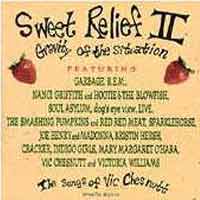
- Kick My Ass - Garbage
- Sponge - R.E.M.
- Gravity of the Situation - Nanci Griffith and Hootie & the Blowfish
- When I Ran Off and Left Her - Soul Asylum
- Dodge - Dog's eye view
- Supernatural - Live
- Sad Peter Pan - The Smashing Pumpkins and Red Red Meat
- West of Rome - Sparklehorse
- Guilty by Association Joe Henry and Madonna
- Panic Pure - Kristin Hersh
- Withering - Cracker
- Free of Hope - Indigo Girls
- Florida Mary - Margaret O'Hara
- God is Good - Vic Chesnutt and Victoria Williams
|

 Mehr ...
Mehr ...
| Every so often our heroes do something to justify the high
regard in which we hold them. So it is with the handful of artists who have
contributed to the "Sweet Relief" compilation series. With the
1993 release of Sweet Relief: A Benefit
For Victoria Williams, the Sweet Relief Musicians Fund announced itself
to the world as an organization dedicated to providing a way for musicians
to pay for medical treatment and deal with financial hardship. What started
out as a benefit album to help Williams pay for treatment of her multiple
sclerosis raised enough funds for her to use the excess to form the Musician's
Fund, which continues to help others who are in need. My unadulterated pleasure
in that release led me to snatch the second volume, Sweet Relief II: Gravity
of the Situation off the shelf without having to think twice, regardless
of the fact that I had no idea who or what Vic Chesnutt was at the time.
(amazon) |
|
| "I think the wonderful thing about this record and
the record they did for me is that they're projects of love. You can feel
in every track that the people who recorded the music put a lot of love
into it. That's why the music feels so good." - Victoria Williams |
|
 weitere Highlights ...
weitere Highlights ...  Died Pretty sind Australier und spielen unspektakulären, aber wunderschönen
und kraftvollen Rock. Keinen Punk. Keinen Metall. Keinen Grunge. Einfach
Rock. Mit einem guten Sänger (Ronald S. Peno), einem Klassegitarristen
(Brett Myers) und solider Rhythmusgruppe. Am besten kommt aber
die fette Hammond B3 von Frank Brunetti. Produziert hat das Ganze
Rob Younger, der Ex-Sänger der kultigen Radio Birdmen,
Australiens Antwort auf MC5 und die Stooges.
Died Pretty sind Australier und spielen unspektakulären, aber wunderschönen
und kraftvollen Rock. Keinen Punk. Keinen Metall. Keinen Grunge. Einfach
Rock. Mit einem guten Sänger (Ronald S. Peno), einem Klassegitarristen
(Brett Myers) und solider Rhythmusgruppe. Am besten kommt aber
die fette Hammond B3 von Frank Brunetti. Produziert hat das Ganze
Rob Younger, der Ex-Sänger der kultigen Radio Birdmen,
Australiens Antwort auf MC5 und die Stooges. Norwegens bestes Trio, aufgestockt sogar zum Quintett durch einen Keyboarder und
Produzent Helge Sten alias Deathprod, der Theremin, Sampler
und Oszillatoren bedient, mit einem ihrer besten Alben: nicht mehr ganz
so hart, mehr Pop, viel psychodelisches Gefrickel. Enthält mit
"S.T.G." einen meiner Lieblingsongs der Band, der in der aktuellen
DVD-Dokumentation auch gleich zweimal
toll gespielt wird.
Norwegens bestes Trio, aufgestockt sogar zum Quintett durch einen Keyboarder und
Produzent Helge Sten alias Deathprod, der Theremin, Sampler
und Oszillatoren bedient, mit einem ihrer besten Alben: nicht mehr ganz
so hart, mehr Pop, viel psychodelisches Gefrickel. Enthält mit
"S.T.G." einen meiner Lieblingsongs der Band, der in der aktuellen
DVD-Dokumentation auch gleich zweimal
toll gespielt wird. Spannender Instrumental-Rock(?) aus Chicago und in Indie-Kreisen ein
überraschungserfolg von den Multiinstrumentalisten John McEntire
(hyperaktiver Tonmischer, Produzent und Schlagzeuger in diversen Bands,
u.a. "The Sea And Cake"),
Douglas McComb (Bassist bei den wunderbaren
Eleventh Dream Day), David Pajo (Will Oldham; aktuell in
der neuen Band von Ex-Smashing Pumkin Billy Corgan, deren Namen
mir gerade nicht einfallen will, irgendwas mit "Z" oder so)
und anderen mir unbekannten Mitstreitern. Klingt alles immer ein bisschen
nach deutschen Bands wie Can und Kraftwerk. Ungewöhnlich
auch, dass die Gitarre meist nur eine untergeordnete Rolle spielt, dafür
aber oft zwei Bässe und zwei Schlagzeuge gleichzeitig eingesetzt
werden.
Spannender Instrumental-Rock(?) aus Chicago und in Indie-Kreisen ein
überraschungserfolg von den Multiinstrumentalisten John McEntire
(hyperaktiver Tonmischer, Produzent und Schlagzeuger in diversen Bands,
u.a. "The Sea And Cake"),
Douglas McComb (Bassist bei den wunderbaren
Eleventh Dream Day), David Pajo (Will Oldham; aktuell in
der neuen Band von Ex-Smashing Pumkin Billy Corgan, deren Namen
mir gerade nicht einfallen will, irgendwas mit "Z" oder so)
und anderen mir unbekannten Mitstreitern. Klingt alles immer ein bisschen
nach deutschen Bands wie Can und Kraftwerk. Ungewöhnlich
auch, dass die Gitarre meist nur eine untergeordnete Rolle spielt, dafür
aber oft zwei Bässe und zwei Schlagzeuge gleichzeitig eingesetzt
werden.
 Mehr ...
Mehr ...
 Willkommen zurück ...
Willkommen zurück ... Mehr ...
Mehr ...
 "Zweitband"
des Sea And Cake-Gitarristen
Archer Prewitt, der hier auch singt. Blöder Bandname, gute
Musik.
"Zweitband"
des Sea And Cake-Gitarristen
Archer Prewitt, der hier auch singt. Blöder Bandname, gute
Musik.  Nach einem Solo/Livealbum von 1991, noch zu Lebzeiten des American
Music Clubs, hier das eigentliche Solodebüt seines Vorsitzenden
nach der Clubschliessung 1994. Zwar war schon das Spätwerk des
Clubs bei Virgin ein kommerzieller Flop, aber man versuchte es nochmal
zusammen. Genauso gelungen. Genauso erfolglos. Wunderbare Platte. Obwohl
Eitzel ein begnadeter Songschreiber ist gefällt mir hier am besten
die Coverversion des Carole King-Klassikers "No Easy Way Down".
Nach einem Solo/Livealbum von 1991, noch zu Lebzeiten des American
Music Clubs, hier das eigentliche Solodebüt seines Vorsitzenden
nach der Clubschliessung 1994. Zwar war schon das Spätwerk des
Clubs bei Virgin ein kommerzieller Flop, aber man versuchte es nochmal
zusammen. Genauso gelungen. Genauso erfolglos. Wunderbare Platte. Obwohl
Eitzel ein begnadeter Songschreiber ist gefällt mir hier am besten
die Coverversion des Carole King-Klassikers "No Easy Way Down". Der Schwanengesang von Duisburgs bester Band (wer lästert da was von
Peter Bursch und seiner "Bröselmaschine"?). Mit den "Gaststars"
Chris Cacavas an der Orgel und
Regisseur Leander Hausmann an der Mundharmonika. Tom Liwa
bringt uns dann noch eine wunderbare Version von "Sweet Thing"
von Van The Man!
Der Schwanengesang von Duisburgs bester Band (wer lästert da was von
Peter Bursch und seiner "Bröselmaschine"?). Mit den "Gaststars"
Chris Cacavas an der Orgel und
Regisseur Leander Hausmann an der Mundharmonika. Tom Liwa
bringt uns dann noch eine wunderbare Version von "Sweet Thing"
von Van The Man! Die Band um die charmante französiche Sängerin Laetitia Sadier und den englischen Gitarristen Time Gane legt hier
ihr zweites Majoralbum vor. Für viele Leute ihr bestes Album. Kann
sein. Aber eigentlich kann ich mich da nicht wirklich entscheiden.
Die Band um die charmante französiche Sängerin Laetitia Sadier und den englischen Gitarristen Time Gane legt hier
ihr zweites Majoralbum vor. Für viele Leute ihr bestes Album. Kann
sein. Aber eigentlich kann ich mich da nicht wirklich entscheiden.
 Mehr ...
Mehr ...
 Ein klasse Album von Johnnys Tochter! Und keine Sorge: das Ganze ist
keine unfertige Skizzensammlung, sondern richtig gut gelungen, wenn
auch auf fette Arrangements verzichtet wurde.
Ein klasse Album von Johnnys Tochter! Und keine Sorge: das Ganze ist
keine unfertige Skizzensammlung, sondern richtig gut gelungen, wenn
auch auf fette Arrangements verzichtet wurde.
 Mehr ...
Mehr ...
 Gut wie alles aus dem Hause Earle. Den Titel "More
Than I Can Do" haben wir uns mit Waiting For Louise ganz hurtig
geschnappt und zu einem festen Bestandteil unseres Repertoires gemacht.
Der obere Link bringt Euch zu einer Liveaufnahme als MP3 vom Januar 2003
Gut wie alles aus dem Hause Earle. Den Titel "More
Than I Can Do" haben wir uns mit Waiting For Louise ganz hurtig
geschnappt und zu einem festen Bestandteil unseres Repertoires gemacht.
Der obere Link bringt Euch zu einer Liveaufnahme als MP3 vom Januar 2003 
 Mehr ...
Mehr ...

 Mehr ...
Mehr ...
 Eine der weltbesten Bluegrassbands. Und (zumindest auf dem Cover) ganz ohne Cowboyhüte.
Eine der weltbesten Bluegrassbands. Und (zumindest auf dem Cover) ganz ohne Cowboyhüte.
 Norma Waterson ist vielen von Euch sicherlich unbekannt, obwohl sie eine der
allerwichtigsten Sängerinnen aus der britischen Folk-Szene ist.
Sicherlich vom Kaliber der leider viel zu früh verstorbenen Sandy
Denny. Nach meinem (in diesem Bereich etwas dürftigen) Wissensstand
hat sie mit diesem titellosen Album erstmals eine Kollektion von zeitgenössischem
Liedmaterial statt traditioneller Lieder vorgelegt: u.a. "Black
Muddy River" von Garcia/Hunter (wodurch wir bei Waiting
For Louise letztendlich erst zu unserer Version inspiriert worden sind),
"St. Swithin's Day" von Billy Bragg, "God Loves
A Drunk" von Richard Thompson, "The Birds Will Still
Be Singing" von Elvis Costello und "Pleasure And Pain"
von Ben Harper.
Norma Waterson ist vielen von Euch sicherlich unbekannt, obwohl sie eine der
allerwichtigsten Sängerinnen aus der britischen Folk-Szene ist.
Sicherlich vom Kaliber der leider viel zu früh verstorbenen Sandy
Denny. Nach meinem (in diesem Bereich etwas dürftigen) Wissensstand
hat sie mit diesem titellosen Album erstmals eine Kollektion von zeitgenössischem
Liedmaterial statt traditioneller Lieder vorgelegt: u.a. "Black
Muddy River" von Garcia/Hunter (wodurch wir bei Waiting
For Louise letztendlich erst zu unserer Version inspiriert worden sind),
"St. Swithin's Day" von Billy Bragg, "God Loves
A Drunk" von Richard Thompson, "The Birds Will Still
Be Singing" von Elvis Costello und "Pleasure And Pain"
von Ben Harper. Eine reaktivierte Bluegrassband aus Kalifornien, die in den 70ern schon mal
in eigener Sache und als Begleitband von Kate
Wolf aktiv war. Zu den alten Mitgliedern David West (Multisaitenvirtuose
und Verantwortlicher der CD-Reihe "Picking On...", hier hauptsächlich
am Banjo zu hören), Bill Griffin (Mandoline) und Wally
Barnick (Bass) kommt als Neuzugang der Gitarrist Mike Mullins.
Das virtuose Spiel stellt sie durchaus in eine Liga mit der Del
McCoury Band, allerdings werden Unterschiede bei der Songauswahl
deutlich, wo die Cache Valley Drifters (als Ex-Hippies?) sich auch bei
Vorlagen aus dem Rock&Pop-Bereich bedienen (hier z.B. "White
Room" von Cream). Wie gesagt, die Burschen sind aus Kalifornien
und nicht aus Nashville!
Eine reaktivierte Bluegrassband aus Kalifornien, die in den 70ern schon mal
in eigener Sache und als Begleitband von Kate
Wolf aktiv war. Zu den alten Mitgliedern David West (Multisaitenvirtuose
und Verantwortlicher der CD-Reihe "Picking On...", hier hauptsächlich
am Banjo zu hören), Bill Griffin (Mandoline) und Wally
Barnick (Bass) kommt als Neuzugang der Gitarrist Mike Mullins.
Das virtuose Spiel stellt sie durchaus in eine Liga mit der Del
McCoury Band, allerdings werden Unterschiede bei der Songauswahl
deutlich, wo die Cache Valley Drifters (als Ex-Hippies?) sich auch bei
Vorlagen aus dem Rock&Pop-Bereich bedienen (hier z.B. "White
Room" von Cream). Wie gesagt, die Burschen sind aus Kalifornien
und nicht aus Nashville! 
 Mehr ...
Mehr ...
 Das Album entstand im legendären Jack Clement Recording Spa
in Nashville, unter Mithilfe von den Sessionspezis Craig Krampf
(drums) und Dave Pomeroy (Bass) und Al Perkins (u.a. bei
Stephen Stills Manassas
und Emmylou Harris' Nash Ramblers
dabei gewesen) an Gitarre, Lap-Steel und Dobro.
Das Album entstand im legendären Jack Clement Recording Spa
in Nashville, unter Mithilfe von den Sessionspezis Craig Krampf
(drums) und Dave Pomeroy (Bass) und Al Perkins (u.a. bei
Stephen Stills Manassas
und Emmylou Harris' Nash Ramblers
dabei gewesen) an Gitarre, Lap-Steel und Dobro.  Mehr ...
Mehr ...
 Da ich eigentlich kein Ween-Fan bin, komme ich besser damit klar, dass
hier nicht der übliche Ween-Stilgemisch geboten wird, sondern Countrymusik
mit viel Humor und einer gewissen Intelligenz, Lässigkeit und Verschrobenheit,
die normalen Nashville-Produktionen völlig abgeht. Dies ist auch
meine erste (somit unvorbelastete) Begegnung mit dem Kosmos von Dean
und Gene Ween und ich kann mit diesem wesentlich mehr mit anfangen als
mit dem, was ich seitdem von den Jungs noch gehört habe ("The
Mollusk" von 1997 und "The Pod" von 1991). Aber mit dieser
Einstellung stehe ich wohl ziemlich alleine da. Ob die Platte mit Songs
wie "Piss Up The Rope" auf der anderen Seite aber echten Countryfreunden
gefällt ist zu bezweifeln. Ob die Jungs aus Bob's Bunker (denkt
an die "Good Old Boys"/" Blues Brothers"!) wohl
lebendig wieder herausgekommen wären?
Da ich eigentlich kein Ween-Fan bin, komme ich besser damit klar, dass
hier nicht der übliche Ween-Stilgemisch geboten wird, sondern Countrymusik
mit viel Humor und einer gewissen Intelligenz, Lässigkeit und Verschrobenheit,
die normalen Nashville-Produktionen völlig abgeht. Dies ist auch
meine erste (somit unvorbelastete) Begegnung mit dem Kosmos von Dean
und Gene Ween und ich kann mit diesem wesentlich mehr mit anfangen als
mit dem, was ich seitdem von den Jungs noch gehört habe ("The
Mollusk" von 1997 und "The Pod" von 1991). Aber mit dieser
Einstellung stehe ich wohl ziemlich alleine da. Ob die Platte mit Songs
wie "Piss Up The Rope" auf der anderen Seite aber echten Countryfreunden
gefällt ist zu bezweifeln. Ob die Jungs aus Bob's Bunker (denkt
an die "Good Old Boys"/" Blues Brothers"!) wohl
lebendig wieder herausgekommen wären?
 Mehr ...
Mehr ...
 Eine gelungene Duo-Aufnahme des weltbesten Dobrospielers Douglas mit einem
der bekanntesten Sänger/Gitarristen aus dem Bluegrass-Bereich.
Rowan spielte schon als Jungspund in der Bands von Bill Monroe,
später mit David Grisman (bei Earth
Opera und Old And In The Way)
und Jerry Garcia (Old And In
The Way).
Eine gelungene Duo-Aufnahme des weltbesten Dobrospielers Douglas mit einem
der bekanntesten Sänger/Gitarristen aus dem Bluegrass-Bereich.
Rowan spielte schon als Jungspund in der Bands von Bill Monroe,
später mit David Grisman (bei Earth
Opera und Old And In The Way)
und Jerry Garcia (Old And In
The Way). Valerie
verdient ihr Geld als Chorsängerin bei James Taylor und
hat es in fast 20 Jahre auf gerade mal 2 Soloalben gebracht. Auf diesem
Album gibt es eine schöne Version von Van Morrisons "Into
The Mystic" mit Lyle Lovett als Duettpartner, die uns
zu unserer W4L-Version inspiriert hat.
Valerie
verdient ihr Geld als Chorsängerin bei James Taylor und
hat es in fast 20 Jahre auf gerade mal 2 Soloalben gebracht. Auf diesem
Album gibt es eine schöne Version von Van Morrisons "Into
The Mystic" mit Lyle Lovett als Duettpartner, die uns
zu unserer W4L-Version inspiriert hat.  70 Minuten lang schafft es dieses amerikanische Trio mit einer Gitarre,
einem Bass, wenigen Trommeln (von einem "Schlagzeug" kann
man eigentlich nicht sprechen!) und zwei Stimmen (vom Ehepaar Trommlerin
Mimi Parker und Gitarrist Alan Sparhawk), spärlichen
Keyboardhintergrundklängen (von Bassist Zak Sally und Produzent
Steve Fisk) eine unvergleichliche Stimmung zu erzeugen!
70 Minuten lang schafft es dieses amerikanische Trio mit einer Gitarre,
einem Bass, wenigen Trommeln (von einem "Schlagzeug" kann
man eigentlich nicht sprechen!) und zwei Stimmen (vom Ehepaar Trommlerin
Mimi Parker und Gitarrist Alan Sparhawk), spärlichen
Keyboardhintergrundklängen (von Bassist Zak Sally und Produzent
Steve Fisk) eine unvergleichliche Stimmung zu erzeugen!
 Mehr ...
Mehr ...
 "In
some ways Belle and Sebastian were almost a recurrence of a Glaswegian
archetype. Hip, smart kids obsessed with utopian 1960s pop and boasting
a healthy lack of interest in kissing corporate butt have always been
an illuminating presence on the Glasgow underground, with a lineage
that runs back through the likes of The Pastels and Orange Juice. At
their best - and 1996's If You're Feeling Sinister is still their strongest
set of songs - they perfectly capture that delirious anything-could-happen
feeling that hits you as you start to leave your teens behind and discover
girls, books, boys, Glasgow late at night, music and venereal disease.
Songwriter and vocalist Stuart Murdoch has a fantastic eye for the surrealism
of everyday life and a deep compassionate joy in the world that is unrivalled
outside Bill Forsyth's Gregory's Girl - that other classic piece of
west-coast urban mythology. The Fox In The Snow is a beautifully lisped
paean to directionless outsiders, waiting just for life to happen to
them, while Like Dylan In The Movies, with its hallucinogenic brass
fantasias and lonely late-night atmospherics, works like dream logic
as Dylan´s benign presence hovers over a long walk home. But it´s
The Stars Of Track And Field that really caps the set, a fantastically
funny and poignant rumination on the loneliness of the small-town sports
star. It´s a record that constantly reminds you of just how magical
Glasgow can be, if only you know where to look. So start right here."
"In
some ways Belle and Sebastian were almost a recurrence of a Glaswegian
archetype. Hip, smart kids obsessed with utopian 1960s pop and boasting
a healthy lack of interest in kissing corporate butt have always been
an illuminating presence on the Glasgow underground, with a lineage
that runs back through the likes of The Pastels and Orange Juice. At
their best - and 1996's If You're Feeling Sinister is still their strongest
set of songs - they perfectly capture that delirious anything-could-happen
feeling that hits you as you start to leave your teens behind and discover
girls, books, boys, Glasgow late at night, music and venereal disease.
Songwriter and vocalist Stuart Murdoch has a fantastic eye for the surrealism
of everyday life and a deep compassionate joy in the world that is unrivalled
outside Bill Forsyth's Gregory's Girl - that other classic piece of
west-coast urban mythology. The Fox In The Snow is a beautifully lisped
paean to directionless outsiders, waiting just for life to happen to
them, while Like Dylan In The Movies, with its hallucinogenic brass
fantasias and lonely late-night atmospherics, works like dream logic
as Dylan´s benign presence hovers over a long walk home. But it´s
The Stars Of Track And Field that really caps the set, a fantastically
funny and poignant rumination on the loneliness of the small-town sports
star. It´s a record that constantly reminds you of just how magical
Glasgow can be, if only you know where to look. So start right here."
 Einer der weltbesten Jazzsaxofonisten spielt "Dark Star" und
andere Grateful Dead-Klassiker! Das ist natürlich was für
mich.
Einer der weltbesten Jazzsaxofonisten spielt "Dark Star" und
andere Grateful Dead-Klassiker! Das ist natürlich was für
mich.
 Mehr ...
Mehr ...

 Gefunden in der digitalen Grabbelkiste!
Gefunden in der digitalen Grabbelkiste! Mehr ...
Mehr ...
 Jeff Tweedy, ehemals Bassist bei Uncle
Tupelo, ist auf diesem Doppelalbum mit seiner Band in Höchstform.
Gegen das Etikett "Alternative-Country" wehrt er sich mit
heftigstem Rock im Stil der Kinks und der Rolling Stones.
Jeff Tweedy, ehemals Bassist bei Uncle
Tupelo, ist auf diesem Doppelalbum mit seiner Band in Höchstform.
Gegen das Etikett "Alternative-Country" wehrt er sich mit
heftigstem Rock im Stil der Kinks und der Rolling Stones.
 Mehr ...
Mehr ...

 Europäische Veröffentlichung auf dem kleinen, aber feinen
Label Trocadero von Januar 2000 der bereits Ende 1993 aufgenommenen
und 1996 auf dem wiederbelebten Südstaatenrocklabel Capricorn
(Allman Brothers, Marshall
Tucker Band, etc.) erschienenen Zusammenarbeit diverser Legenden
aus Athens/Georgia: da wäre zuerst einmal Vic
Chesnutt (Songwriter extraordinaire, u.a. Autor von "Gravity
Of The Situation" aus dem W4L-Repertoire), dann die Southern-Rock/Jam
Band Widespread Panic, sowie Produzent John Keane (u.a.
R.E.M.), der auch noch ausgezeichnet Steelgitarre spielt.
Europäische Veröffentlichung auf dem kleinen, aber feinen
Label Trocadero von Januar 2000 der bereits Ende 1993 aufgenommenen
und 1996 auf dem wiederbelebten Südstaatenrocklabel Capricorn
(Allman Brothers, Marshall
Tucker Band, etc.) erschienenen Zusammenarbeit diverser Legenden
aus Athens/Georgia: da wäre zuerst einmal Vic
Chesnutt (Songwriter extraordinaire, u.a. Autor von "Gravity
Of The Situation" aus dem W4L-Repertoire), dann die Southern-Rock/Jam
Band Widespread Panic, sowie Produzent John Keane (u.a.
R.E.M.), der auch noch ausgezeichnet Steelgitarre spielt. 
 Das zweite Ida-Album entstand Januar 1996 im Trio: dazugekommen
war Daniels Bruder Michael Littleton am Schlagzeug. Was nicht
heißen soll, dass hier gerockt wird. Rick Lassiter ist ebenfalls
wieder mit seinem Kontrabass dabei, zusammen mit Daniels und Michaels
Schwester Cecilia Littleton (Geige und Bratsche) sorgt er für
schöne Streicherhintergründe.
Das zweite Ida-Album entstand Januar 1996 im Trio: dazugekommen
war Daniels Bruder Michael Littleton am Schlagzeug. Was nicht
heißen soll, dass hier gerockt wird. Rick Lassiter ist ebenfalls
wieder mit seinem Kontrabass dabei, zusammen mit Daniels und Michaels
Schwester Cecilia Littleton (Geige und Bratsche) sorgt er für
schöne Streicherhintergründe.
 Mehr ...
Mehr ...
 Ob man "Mutton Birds" wirklich mit "Hammel Vögeln"
übersetzen kann - das kann ich mit meinen Kenntnissen der Englischen
Sprache nicht sicher sagen. Auf jeden Fall handelt es sich bei "Neider
von Engeln" um eine ganz wunderbare Gitarrenpop-Platte, die mir
da bislang entgangen ist. Das hat sicherlich damit zu tun, dass die
Band von Sänger, Gitarrist und Hauptsongschreiber Don McGlashan
nur in ihrer Heimat Neuseeland - und vielleicht noch Australien - ein
wenig erfolgreich waren. Immerhin wurde dieses dritte Album vom bekannten
britischen Produzenten Hugh Jones (Echo
& The Bunnyman, del Amitri,
Dumptruck, etc.) in den legendären
Rockfield Studios in Wales aufgenommen.
Ob man "Mutton Birds" wirklich mit "Hammel Vögeln"
übersetzen kann - das kann ich mit meinen Kenntnissen der Englischen
Sprache nicht sicher sagen. Auf jeden Fall handelt es sich bei "Neider
von Engeln" um eine ganz wunderbare Gitarrenpop-Platte, die mir
da bislang entgangen ist. Das hat sicherlich damit zu tun, dass die
Band von Sänger, Gitarrist und Hauptsongschreiber Don McGlashan
nur in ihrer Heimat Neuseeland - und vielleicht noch Australien - ein
wenig erfolgreich waren. Immerhin wurde dieses dritte Album vom bekannten
britischen Produzenten Hugh Jones (Echo
& The Bunnyman, del Amitri,
Dumptruck, etc.) in den legendären
Rockfield Studios in Wales aufgenommen. Mehr ...
Mehr ...

 Mehr ...
Mehr ...
